It’s almost eight years to the day that the hurricane wreaking havoc across French football came to the attention of the rest of Europe. Drogba, then with OM Marseille almost single-handedly tore Premiership side Newcastle apart in a first leg game of the UEFA Cup semi-final in 2004. The first of his two goals underlined his strength, pace and power but also the deft technique that he used to backheel the ball around a baffled Aaron Hughes. In the return game at St James Park, the Ivorian made an even louder statement without actually scoring a goal when he collected the ball from thirty yards out, brushed Hughes off like a rag doll and unleashed a powerful shot that crashed against the frame of Shay Given’s goal. After a couple of minutes replaying the effort on TV, the camera returned to the goalpost Drogba had struck. It was still shaking.
Drogba’s arrival at Marseille marked the culmination of what had been at times a rocky and difficult time in the country. Born in Abidjan on March 11th, 1978, the boy known to his family as ‘Tito’ was only five years old when he left the Ivory Coast for France at the behest of Michel Goba, one of Drogba’s uncles who was plying his trade in the French lower division. A commanding presence in his nephew’s life, Goba not only ensured that his new companion kept on top of his school work but was also adamant that Drogba, who started his youth football days playing as a right back, reinvent himself as a striker. Drogba would return to the Ivory Coast when he was eight years old following sever home-sickness but was soon back in France when his parents both lost their jobs as accountants.
Fast forward to 1998 and the Ivorian, then on apprenticeship terms with second tier French side Levallois, signed with Le Mans in the same division so that he could study accountancy himself at the city’s university. The reasoning for his transfer was blunt, despite being courted by several big clubs including Paris Saint Germain, Drogba was still not convinced he would make it as a professional and was preparing for life outside of football.
A slew of injuries that included breaking his metatarsal twice in two years meant life wasn’t easy for the striker but by 1999, Drogba had quit university, signed a professional contract and played a full season in the French second division, scoring seven times in thirty games.
The subsequent season did not go as well and Drogba was played on the wing whilst his preferred centre forward position was given instead to the club’s other young starlet, the future Rangers and Hull striker, Daniel Cousin. However, for once, luck was with the Ivorian and having stuck with Cousin in 2002, Le Mans sold Drogba on to Guingamp, one of his earlier suitors four years previously.
His new side had not forgotten the potential of the powerful forward and had few qualms about the £80,000 transfer fee required to get their man. Now being played in his preferred position and in the French top division, Ligue 1, it was Drogba’s chance to shine and the next few years were continuously successful for the Ivorian. In Guingamp, aided by his partnership with future Chelsea teammate Flourent Malouda, the new arrival scored twenty times in two seasons and made his debut for the Ivorian national team before Marseille came calling with a cheque for £3.3 million.
A single season was all it took for L’OM to recoup their investment and then some. Drogba scored nineteen times in thirty-five games and the team made its way to the UEFA Cup Final only to lose 2-0 to a Valencia side that had already been crowned La Liga champions. A plethora of big European names were forming an orderly line outside the Stade Veldrome but it would be cash-flush Chelsea, still in the early stages of the Roman Abramovich era, that secured his signature.
Twenty-four million pounds later, Drogba was in South London teaming up with another new arrival, a maverick young Portuguese manager who’d won the UEFA Cup and the Champions League in back-to-back years.
It would be under Jose Mourinho that Chelsea, with Drogba as its chief goal scorer, would start to enjoy extended domestic success and during the time the Ivorian was at Stamford Bridge, Chelsea won three Premier League titles, four FA Cups and the 2011/12 Champions League.
However, there were still black marks on the striker’s copy book throughout his career with Chelsea. A running feud with perpetual nemesis Nemanja Vidic saw the Manchester United defender lose a tooth to one of Drogba’s wayward elbows in one encounter whilst the Chelsea player was sent off for slapping the Serbian in the 2007/08 Champions League final. Former Liverpool manager, Rafa Benitez, who had been Valencia’s coach when they overcame Marseille in the 2004 UEFA Cup final, continually labelled him as a persistent diver and the two enjoyed an openly contemptuous relationship throughout the Spaniard’s time at Anfield.
Yet despite his critics, Drogba remained an unquestionably potent and consistent striker. He scored in all seven of the major cup finals he played in- most memorably his 87th minute equalizer against Bayern Munich in the most recent Champions League final. The Ivorian has also been consistently able to beat out the competition during his time at Chelsea; Hernan Crespo, Andrei Shevchenko and Fernando Torres have all tried and failed to consistently force the striker out of the starting line-up.
The final chapter of Didier Drogba’s storied career that began with spells in the French second division will now end in Chinese Premier League. Now among the best paid and well-known athletes to play in Asian football, things have come a long way for the man who didn’t turn professional until he was almost twenty-two years old. For Shenhua fans starved of glory, it is now hoped that Drogba can work his magic one last time.
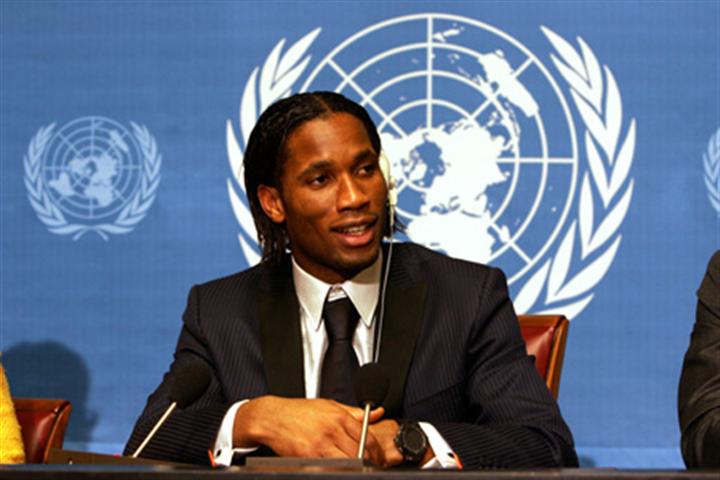
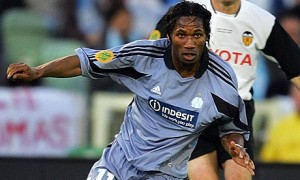
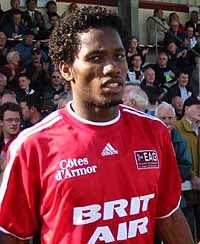
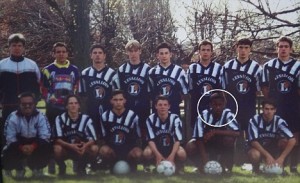
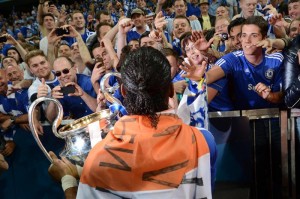
I cannot express my admiration for the man enough. 🙂